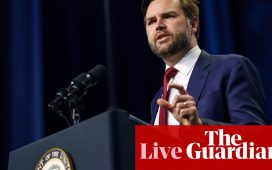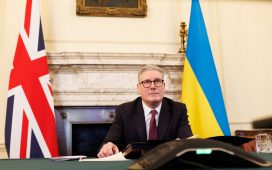The archbishops of Canterbury and York have joined the growing list of critics of the government’s new extremism definition, which they have warned risks “disproportionately targeting Muslim communities” and “driving us apart”.
Michael Gove will present his new counter-extremism strategy on Thursday, which he says will target organisations that undermine British democracy.
The communities secretary is expected to say the government is changing its official definition to catch groups that subvert British democracy and to focus more on ideology than purely on words or actions.
In a joint statement, Justin Welby and Stephen Cottrell said labelling a multifaceted problem as hateful extremism may “vilify the wrong people and risk yet more division”.
The statement added: “The new definition being proposed not only inadvertently threatens freedom of speech, but also the right to worship and peaceful protest – things that have been hard won and form the fabric of a civilised society.
“Crucially, it risks disproportionately targeting Muslim communities, who are already experiencing rising levels of hate and abuse.
“We are concerned – like so many others – by its implications for public life. We join calls for the government to reconsider its approach and instead have a broad-based conversation with all those who it will affect.
“The Church of England would be very willing to fulfil part of its historic role by sharing in facilitating that conversation.
“The UK has a proud history of welcoming people from all walks of life and celebrating diversity. We are a community of communities. Our leaders should cherish and promote that – and pursue policies that bring us together, not risk driving us apart.”
Under the current guidelines, individuals or groups are only defined as extremist if they show “vocal or active opposition to British fundamental values, including democracy, the rule of law, individual liberty and the mutual respect and tolerance of different faiths and beliefs”.
Gove will also tell government bodies, including agencies, not to engage with or fund any group defined as extremist under the new rules.
The Guardian reported on Tuesday that Gove wants to use parliamentary privilege to name groups that he says fall foul of his new definition of extremism despite pushback from government lawyers about the legal implications of doing so.
Three non-governmental organisations – Liberty, Friends of the Earth and Amnesty International UK – have also warned against making the definition of extremism too broad.
The groups said: “Any suggestion that the government or political parties should ban all meetings or engagement with legal civil society organisations or sections of the electorate is profoundly anti-democratic and sets a dangerous precedent.”
Their statement comes after 12 anti-extremism experts – including three former Conservative home secretaries, Dame Priti Patel, Sir Sajid Javid and Amber Rudd – signed up to a statement warning about the risks of politicising such a sensitive area of government policy.
Tom Tugendhat, the security minister, said on Monday he agreed with the statement and said the government was not seeking to use the issue for party political reasons.












